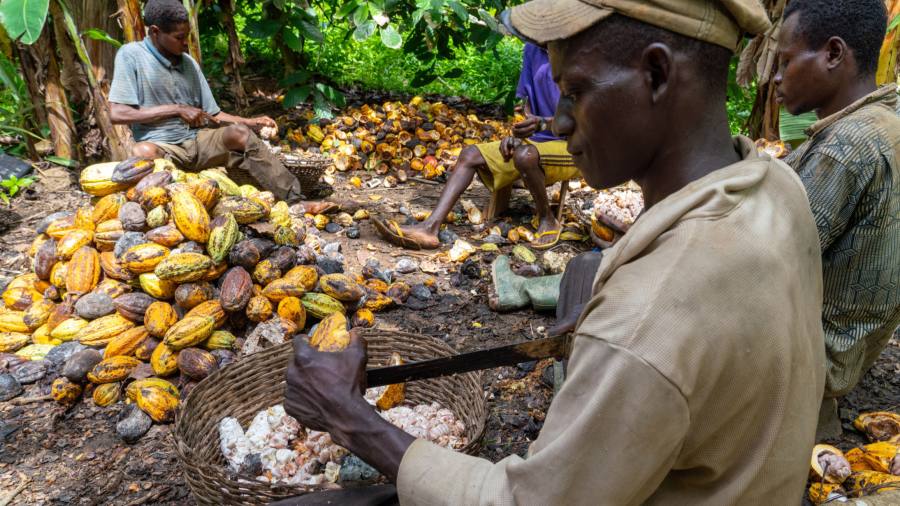
Mondelez has become the latest food company to step up its efforts to raise pay and reduce child labour in cocoa farming, as tensions flare between the African nations that produce much of the global crop and the chocolate industry.
The owner of brands from Cadbury to Toblerone said on Wednesday that it would commit an additional $600mn in sustainability funding until 2030, on top of $400mn invested over the past decade.
The move comes on the eve of an annual meeting of the World Cocoa Federation in Brussels that has been boycotted by officials from Ivory Coast and Ghana, by far the biggest cocoa-producing countries, over prices paid by the industry for the bean.
Cocoa farmers in Ghana have an average income of about $1 a day, while their counterparts in Ivory Coast make just $0.78 a day, according to the World Economic Forum — well below the extreme poverty line of $2.15 a day established by the World Bank.
Big chocolate companies have made a series of moves to help address the problem, with Nestlé this year announcing it would pay west African farmers for not using child labour in their supply chain.
However, the industry’s moves to increase direct payments to farmers have coincided with efforts by Ghana and Ivory Coast, which account for 60 per cent of cocoa supply, to create an Opec-styled organisation to push up prices.
The countries’ 2019 introduction of a “living income differential” (LID) premium of $400 a tonne over the benchmark cocoa futures price has pushed cocoa buyers to whittle down a separate quality premium on the beans from Ghana and the Ivory Coast, in effect negating the impact of the LID.
“There is a stand-off between Ghana and the Ivory Coast on the one hand and the cocoa industry on the other,” said Jonathan Parkman at commodities brokers Marex. The cocoa producers “have raised their asking price to levels a long way above where it was trading”, he added. “The industry don’t like the risks involved in paying those kinds of prices.”
Many chocolate companies and cocoa traders highlight the benefits of their own sustainability programmes, which aim to help local communities directly, for example through provision of training and schools.
“We have to keep in mind is that cocoa is a traded commodity, which has its own price setting mechanism,” said Mondelez chief executive Dirk Van de Put, adding that it wanted to reach the farmers directly, and educate, train and incentivise them through payments rather than through market prices.
Fiifi Boafo of Ghana’s cocoa regulator Cocobod said it and its Ivory Coast counterpart had boycotted the WCF meeting because the chocolate companies and traders were not behaving in a way that showed they were interested in the industry’s sustainability.
“If you want the farmers to protect the forests and prevent child labour you cannot pay less” for cocoa, he said, adding that the governments might prevent their farmers from accessing the corporate sustainability programmes. Nigeria and Cameroon have discussed joining the pricing initiative, which would expand its coverage to about three-quarters of world cocoa supplies.
Van de Put said it was “a pity” that Ivory Coast and Ghana were not around the table in Brussels and called for conversation and collaboration.
Pascal Vandenberghen at Tony’s Chocolonely, a Dutch company focused on sustainable chocolate, said it was essential to work out a credible and transparent system to pay farmers fairly.
The company pays extra directly to farmers above the farmgate price paid by the governments to meet a reference price set by Fairtrade, a certification system meant to support farmers in developing countries.
Campaigners have long called on the chocolate industry to pay more for cocoa to reduce poverty, saying farmers are victims of an unfair system.
“The industry is trying to get the cocoa as low as possible,” said Antonie Fountain, managing director of the Voice Network, an umbrella group for 17 non-profit organisations. “It works well for the companies, traders and consumers. The system was never meant to be fair to the farmers in the first place.”